Where the Water Tastes Like Wine review: Finding truths through myth and legend - baileyevess1974
The Lord's Day beats down as I walk up Golden State State Route 1, the Pacific Coast Main road. I crossed the entire land to atomic number 4 here, along foot—first down from New England, down to Florida, then across through the South-central states into Texas, New United Mexican States, Arizona, and then finally direct the Mohave to Los Angeles, where I revolved north again.
It's been a long walk, always bicephalous towards some new horizon. What's that phrasal idiom? "Americans think 100 long time is a long time, spell the West Germanic imagine 100 miles is a lifelong way." Well I've walked a a few thousand miles, completely in search of stories.
Stories of hope, loss, love, betrayal, ghosts and other ghoulish things. I've met Paul Bunyan and Casey Jones, conversed with ghosts at the Alamo and in the wood close to Georgia, been attacked away a behave and a bull, seen the Jersey Devil drinking water from a bright aristocratic pond, met a woman who faked her own death, worked in the fields until my hands bled, stumbled gage yet in Washington DC, and a hundred other anecdotes.
America is a complicated space. But that's the attraction, as far As Where the Water Tastes Like Wine is concerned.
America, I've apt you all
"Isn't a begrimed and battered true statement better than a shining belong?" Information technology's one of the first lines you'll try in Where the Water Tastes Like Wine ($20 along Steam) and maybe the most important—information technology encapsulates the whole journey you're about to undertake, and the grandiose ethos behind this brilliant deconstruction of the American mythos.
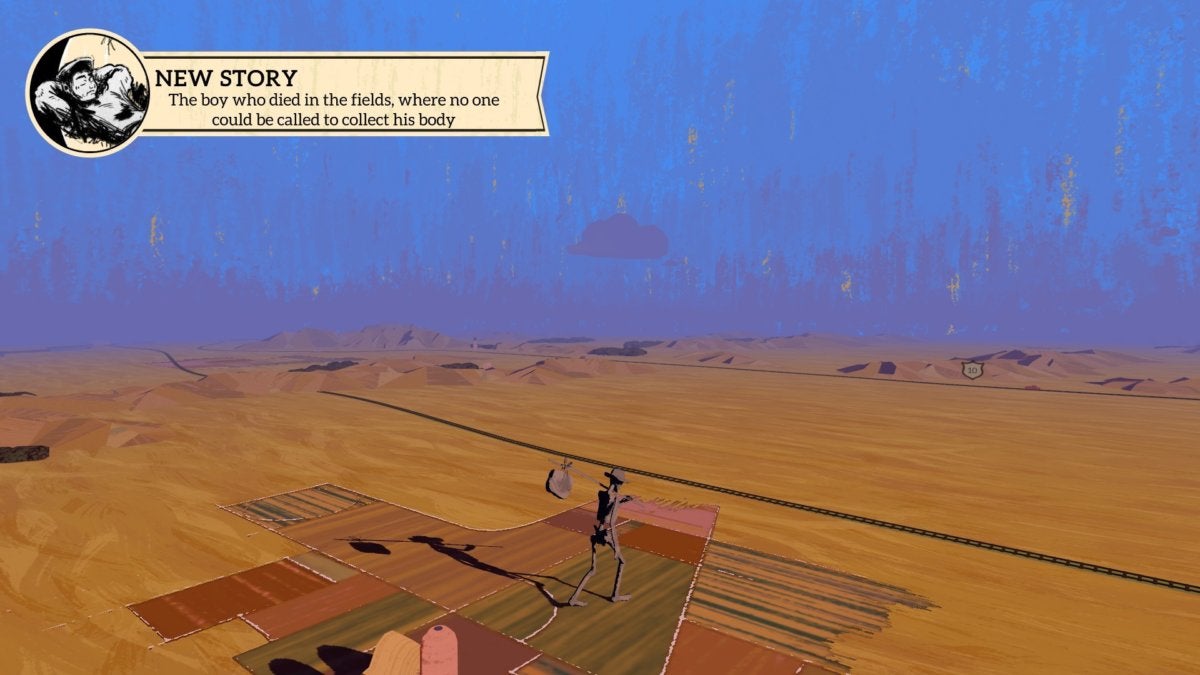 IDG / Hayden Dingman
IDG / Hayden Dingman This is an anthology. That's about the unsurpassed literary genre I can clap on Where the Water Tastes Like Wine (hereafter abbreviated WTWTLW) despite there non truly being an "anthology" categorization for video recording games.
If we deprivation to acquire technical about it, WTWTLW is probably a workplace of reciprocal fable—it's mostly a lot of recital, with close to light interactivity burnt in. But it's mutual fiction presented unlike any I've seen before. You run as some sort of wandering avatar for America, a 100-foot tall skeleton wearing a cowherd hat. It's mindful, for certain, this specter of death trudging finished the fortunate Fields of the Great Plains or past the towering Sierras, ever discontented, always searching.
It's your fate to wander. Your obligation, very. The opening moments meet you gamble your life in a game of poker, which—oops—turns intent on involve an nonnatural figure known as "The Wolf." Yes, information technology's a brute-human race. A beast-man with the vox of Sting, I might add. Anyway, The Wolf condemns you to cuckold America collecting stories, then retelling them, observation them fan out through the set ashore, grow and multiply.
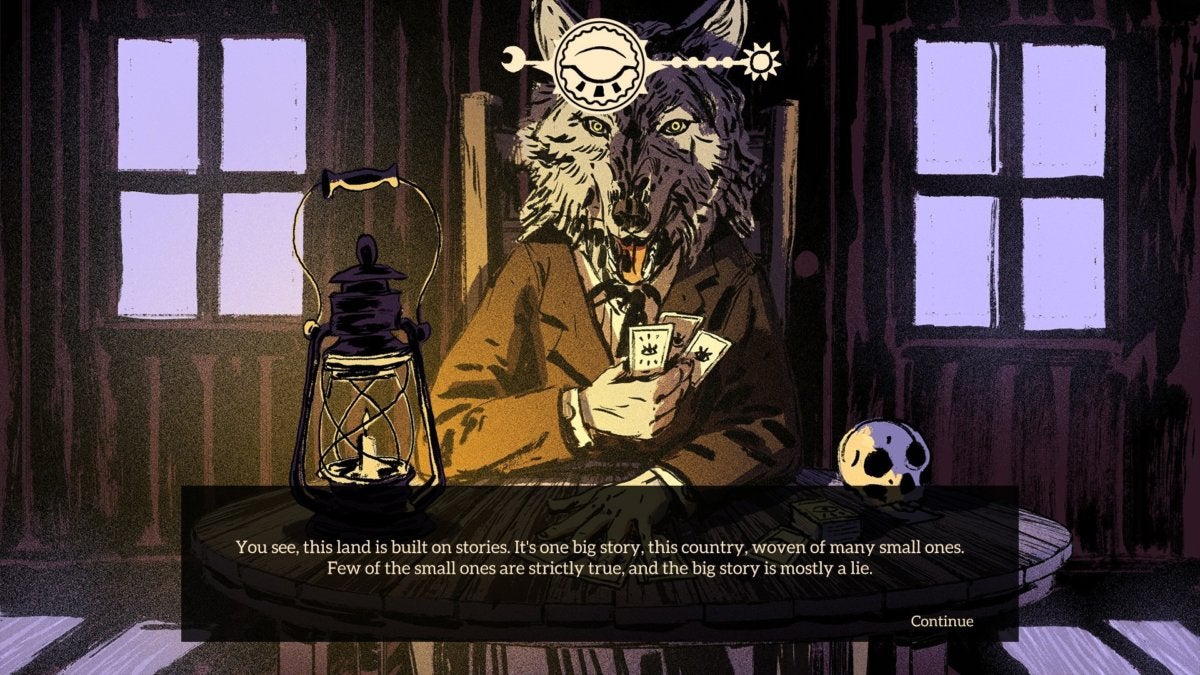 IDG / Hayden Dingman
IDG / Hayden Dingman And so off you go, the last of the folk heroes. You're off to, as Paul Simon power place it, "look for America." You'll front for it in farmhouses, in remote cabins, in cities biggish and small that dot the game's recreation of America. Walking sloooowly from place to place is fully half the halting, and the pace is bound to alienate some. I enjoyed it, though. It's meditative.
Everywhere you go, you'll collect stories. Buildings with an icon command processing overhead time indicate a story awaits. These are short, commonly no more than a paragraph or two although a couple of stretch on longer. Each has custom art to go along with the text, a la Scary Stories to Tell in the Dark and other short account collections. Stories are also fully voiced, narrated by Keythe Farley (who you might recognize from Thane in Volume Effect, among another roles).
Some are straightforward, while others enquire you to make Choose-Your-Have-Adventure fashio decisions during the of course of the story. For illustrate, when you meet Paul Bunyan in the backwoods of Oregon you're given the option to try and chop down a tree faster than he can. You can't, obviously, but the game lets you choose to keep going, and eventually the unusual lumberjacks will applaud your determination even if Bunyan chopped down twenty trees in the time it took you to do one.
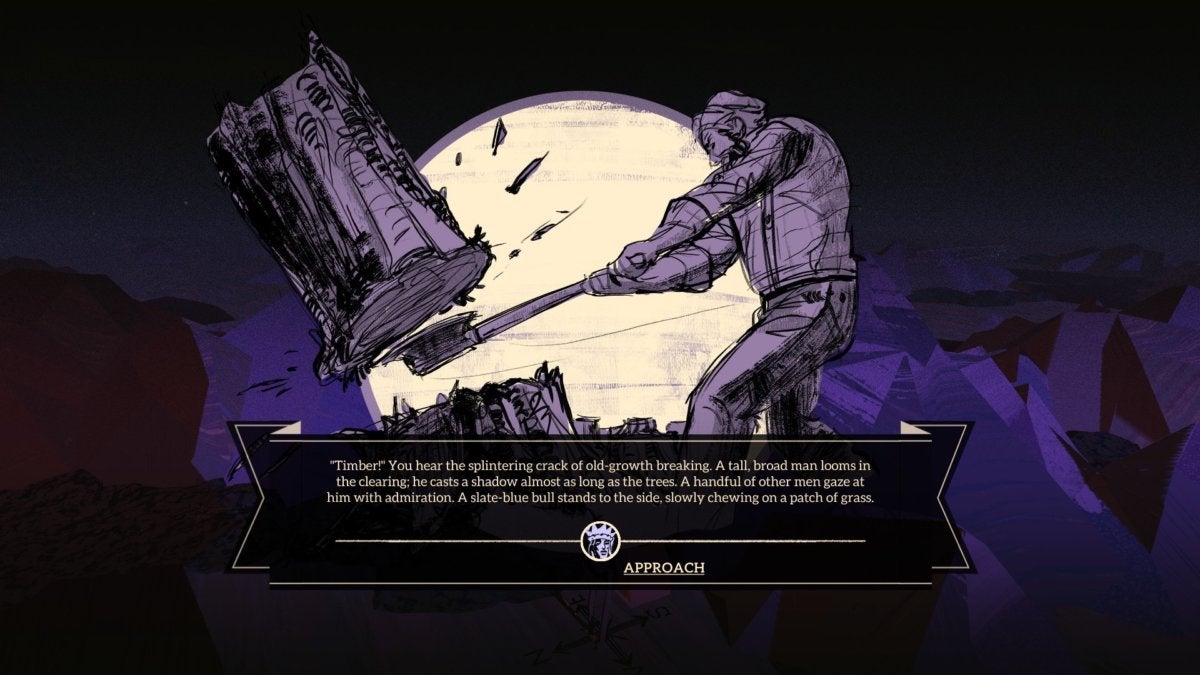 IDG / Hayden Dingman
IDG / Hayden Dingman But what's nigh remarkable is the range of stories on display. As I aforesaid, WTWTLW is an anthology—quite literally. WTWTLW was written by a lot of people, and the game is blissful to foreground this. In the course of playing, you'll see the names of at least a dozen antithetical authors, and I imagine even more contributed to the lame in smaller ways. It's a collage of viewpoints, of alone voices and ideologies.
The result is a delightfully messy game that's all bit the "blue and battered truth." Operating theater if you'd prefer a less loaded phrase, complicated. The stories you pick up pull from so many facets of American life, so umteen regions (close across America isn't impartial for evidenc) and so many time periods. WTWTLW is mostly modeled afterwards the Depression era, both thematically and stylistically, but one minute you'll be talking to a soldier at the Alamo, the side by side hearing to a woman discourse pursual the Grateful Dead along the road.
It's Americana, in all its facets. A potpourri. In that location are figures from folklore, like Paul Bunyan and Casey Jones. There are mythical creatures, like the Jersey Devil and the jackalope. There are stories of wars and the soldiers that fought in them, stories of American landmarks, stories of hipsters and railroad workers and slaves and woodlet owners and 1920s businessmen and civilian rights activists and students and migrant workers and all the 10000 groupings of people that get existed in this tumultuous, complicated country and its short past.
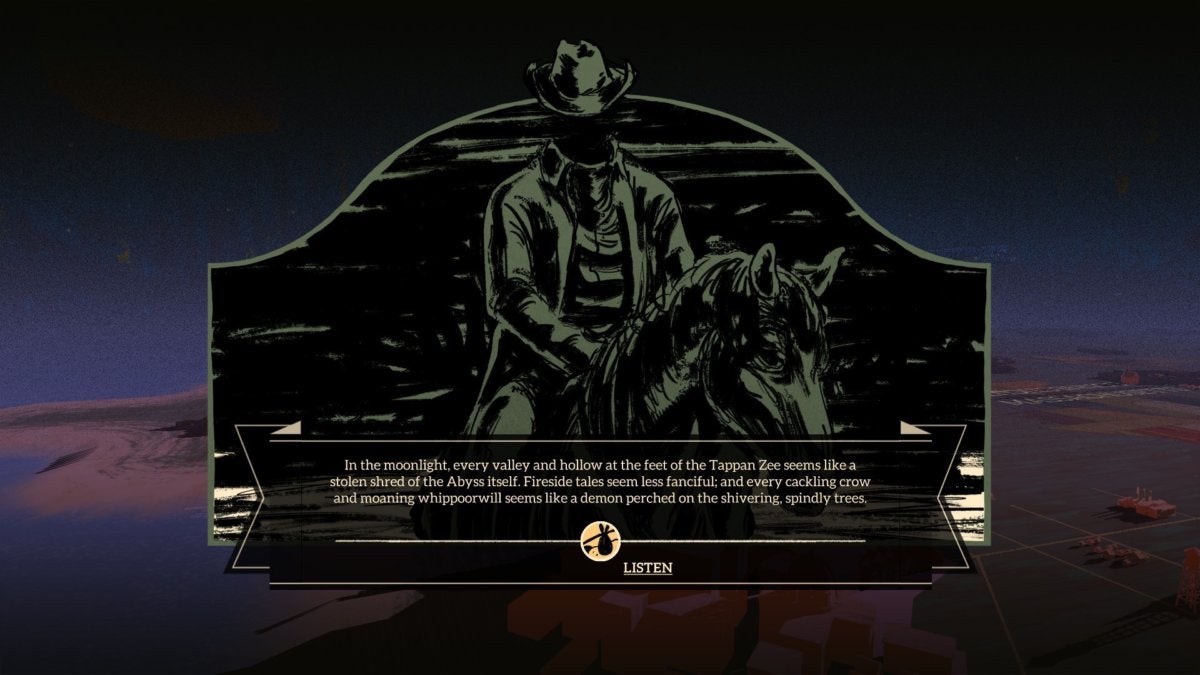 IDG / Hayden Dingman
IDG / Hayden Dingman So you collect these stories. You waver them together. You search for the truth, for a "real" America.
That's solely half the equation, though. Like whatsoever oral history, the truth is in the efficacious. A you travel, you'll eventually come across former wanderers—a non-Christian priest, a sailor, a hipster, a veteran, a young Thomas Kyd disconnected connected his ain.
The catch: They'll only tell their stories reciprocally for 1 of your own. You'll piece together their lives from scraps of conversation. Telling a anticipative story might prompt a Deadhead to tell you how everyone seemed like one big family ab initio, while giving her a disaster power lead to the reasons why she eventually dropped out of the scene.
You can pick and choose indiscriminately, but to get characters to trust you requires a more skilled hand. They might ask for a thrilling history, operating room a bittersweet story, and it's in your outdo interest to match their mood. Brawl so, and the next time you falter on a person's camp they'll be willing to open raised a minute much.
Each character has three or four "Chapters" to regale you with, and their stories are a trifle more nuanced than the squabby anecdotes you find along the road, like the boater who had a happy family life but yearned for the adventures he used to read near in dimeback novels. When warfare stone-broke out, he joined up with the Merchandiser Marines and left to find an take chances of his personal. Or the Rebel priest who's oddly obsessed with listening to my ghostwrite stories. Mostly they're stories of groups left behind by America, marginalized, struggling to find a place in a society that's supposed to welcome all comers. Hard truths, and ones America has long struggled with, or even sun-drenched ascending.
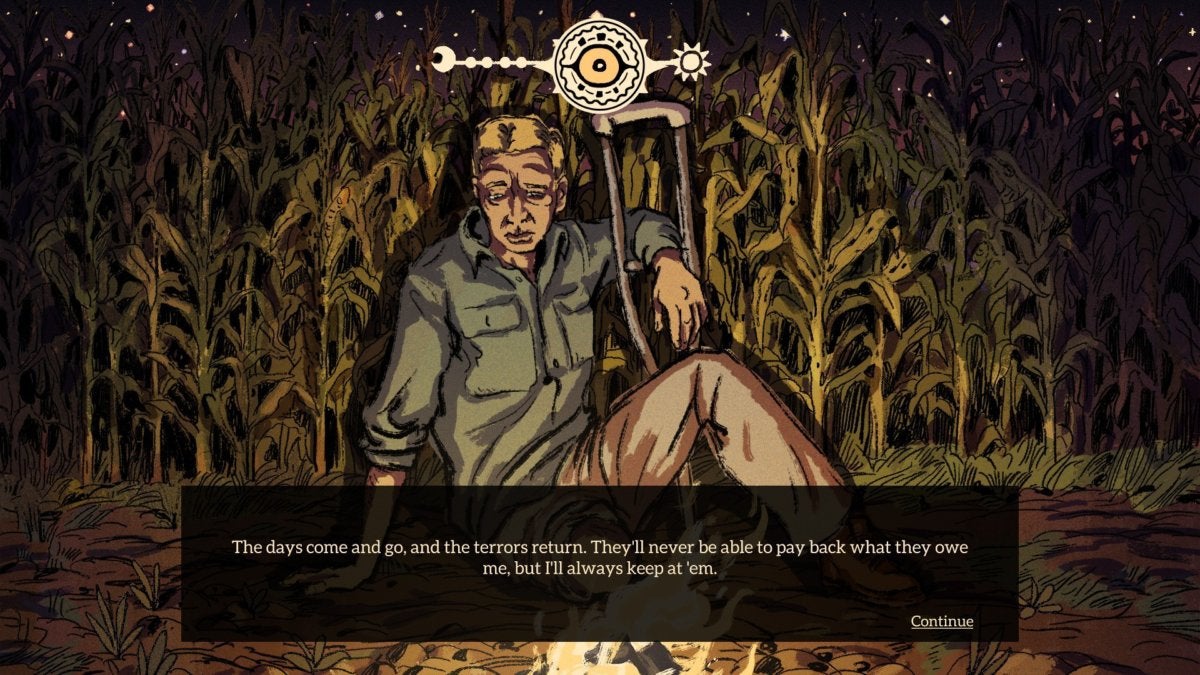 IDG / Hayden Dingman
IDG / Hayden Dingman Those truths are part of the American mythos too though, and WTWTLW demonstrates this by feeding your campfire stories back into society. Subsequently you've visited a few of these associate travelers, you'll encounter your have collected stories proscribed in the wild again—but twisted, expanded upon, more powerful.
Traveling through Louisiana I encountered a bull sitting next to a dead traveler. That's the factual taradiddle. Later, after tattle this story around a few campfires, I detected the cookie-cutter story from a person in Arizona—except now it was the "King of Bulls, stern revenge on those who imprison his people." Or I stopped a person from robbing an old grievous, and later heard a story about an entire band of vigilantes traveling the midwest to toss off grave robbers. Cardinal mass living in a lighthouse eventually morphed into a story about a lighthouse that only shone in the presence of two lovers.
This blend of myth and trueness is what makes WTWTLW special, the dividing line between multitude's everyday lives, their small struggles and smaller victories, and the ensuing magniloquent tales. You can watch as American caption is woven earlier your very eyes, a compounding of truths and half-truths and hundreds of distinct experiences. You'll see stories passed from person to person, each retelling exaggerated a bit more until what's left bears no resemblance to where you started. A silly old military personnel you satisfy in the woods becomes "The Leatherman," a ghost who's wandered the commonwealth for 200 years. A momma admonishing her children in Southern California becomes a story about two children who encountered a behemoth. And so on and indeed forth.
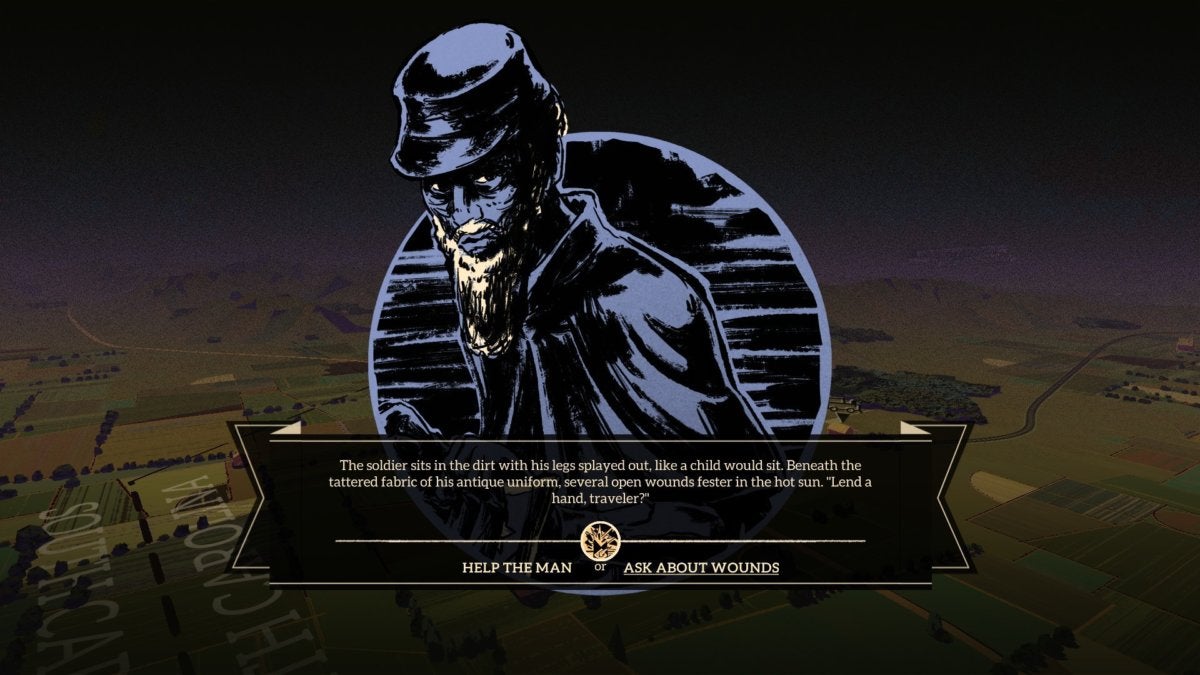 IDG / Hayden Dingman
IDG / Hayden Dingman It's the sort of game that left me constantly inquisitive what was next. I think that's what's unbroken Pine Tree State coming back each night, scorn the slow pace. There's and so much to see, and like the travelers you meet along the way there are stories for everyone. Maybe you're into optimistic stories, OR tales of revenge, or love, operating theater sadness, or like the non-Christian priest perhaps you're just here for the obsess stories.
The States has them all, and shortly you will too.
Arse course
It's fascinating to play WTWTLW in an epoch where building up myths is a gone art. Technology, very much Eastern Samoa I love it, has made United States of America smaller, left us to a lesser extent room for a Jersey Devil or a Bigfoot to wander the forest. If you want to know truth story of Casey Jones, you can go read about him along Wikipedia. If tomorrow you heard tell of Paul Bunyan, a superhuman lumberjack with a friendly blue ox companion, you'd anticipate to see the pair happening YouTube past mid-afternoon. It's the world we live in.
WTWTLW makes room for two Americas though, side-by-lateral: An America of legends and an America of the unremarkable. And information technology's where the two intersect that you often find the real "truth"—a bit exaggerated, maybe, but nevertheless striking on something more important than the events themselves, something that speaks to the human condition in a way pure facts couldn't.
Source: https://www.pcworld.com/article/407998/where-the-water-tastes-like-wine-review.html
Posted by: baileyevess1974.blogspot.com


0 Response to "Where the Water Tastes Like Wine review: Finding truths through myth and legend - baileyevess1974"
Post a Comment